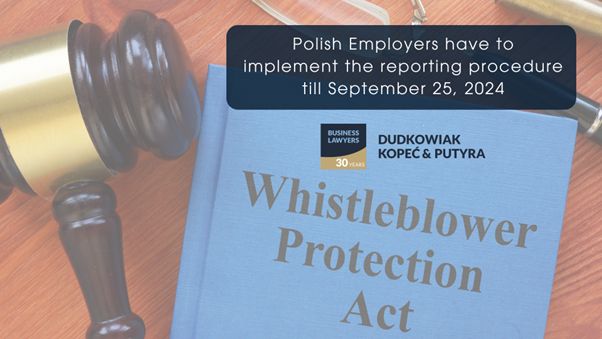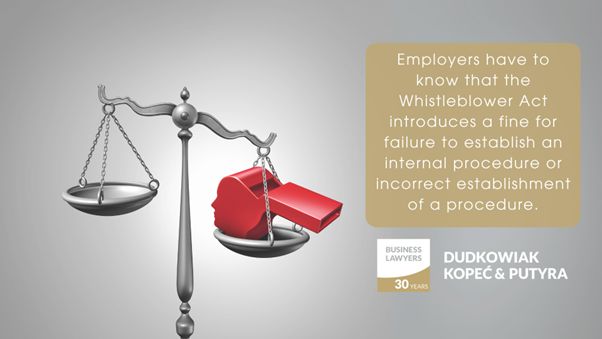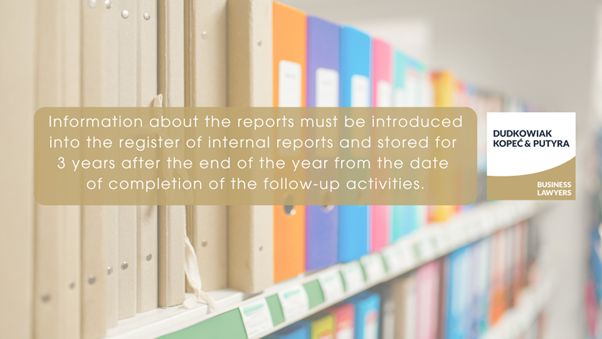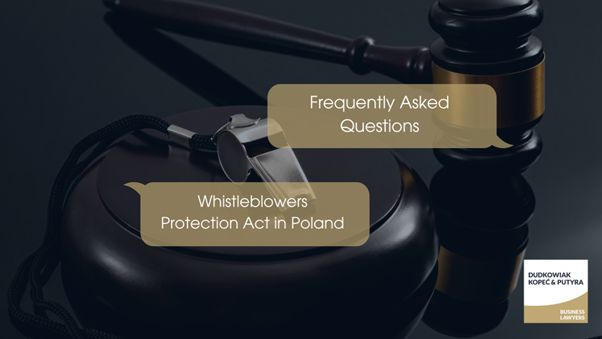- within Employment and HR topic(s)
- in Asia
- within Employment and HR topic(s)
- in Asia
- in Asia
- in Asia
- within Employment and HR, Corporate/Commercial Law, Media, Telecoms, IT and Entertainment topic(s)
- with readers working within the Media & Information industries
Implementation term of the EU Whistleblower Directive 2019/1937 in Poland passed on December 16, 2021.
It took a political change that almost 3 years later, the Polish Parliament finally announced new law on June 24, 2024. This means that Polish Employers have to implement the reporting procedure till September 25, 2024 (because of 3 months vacatio legis).

Who is obliged to implement the procedure?
Obligation of implementing internal whistleblowing procedure rests with employers who hire 50 people, not only under employment contract (converted into full-time equivalents) but also persons employed under a mandate contract and persons employed under B2B contracts if they personally provide services.
New law obliges to adopt whistleblowing procedure also the entities operating in the field of:
- financial services,
- products, and
- markets, as well as
- anti-money laundering and
- countering the financing of terrorism,
- transport safety, and
- environmental protection,
regardless of the number of people performing work.
Check the employment level twice a year
What is important, employers are obliged to check the employment level twice a year- on January 1 and July 1. When the number of hires amounts to or exceeds 50, implementation of the internal reporting procedure according to Whistleblower Protection Act becomes an obligation.
When employers should implement the procedure
According to the Act, new law shall enter into force on September 25, 2024. However, the Ministry of Family Affairs, Labor and Social Policy in the statement released on August 6, 2024 clarified that employers have been granted an extended timeframe to implement internal reporting procedure.
This is explained by the fact that checking the employment level for the first time will happen on January 1, 2025. On this date employers will be able to determine whether they are required to implement the procedure.
It shall be pointed out that the interpretation of the Ministry is not a binding source of law in Poland, and therefore we recommend following the date set in the Act i.e. September 25, 2024.
Employers have to know that the Whistleblower Act introduces a fine for failure to establish an internal procedure or incorrect establishment of a procedure.

The most important facts of Whistleblowing system in Poland
| Mandatory | Optional | |
|---|---|---|
| Entities obliged to introduce whistleblowing procedure |
|
Employers under 50 people |
| Deadline to introduce whistleblowing procedure | Until September 25, 2024 | No deadline |
| Anonymous reporting | Not mandatory | Not mandatory |
| Incentive for whistleblowers | Not mandatory | Not mandatory |
Who the whistleblower is?
The whistleblower is an individual who reports or publicly discloses information about a violation of law obtained in a work-related context. Whistleblower may be for example a current or former employees, contractors, candidates for employment, trainees, as well as volunteers.
Violation may be reported by the whistleblower in any form: oral, written or electronic (e.g. via dedicated e-mail address, platform, or app like Whistlelink).
What is very important, whistleblower is widely protected by the Whistleblower Protection program from retaliation for e.g. dismissal, exclusion, omission in promotion or training or mobbing practices. The list of prohibited whistleblower retaliation is open, and the Act sets only the minimum.
A whistleblower against whom retaliatory actions have been committed is entitled to compensation in an amount not lower than the average monthly remuneration in the national economy in the previous year.
Internal reporting procedure
Entities covered by the obligations set in the Whistleblower Protection enhancement Act have to introduce internal whistleblowing procedures regulating reporting channels and follow up actions.
Employees must be informed on how to make a protected disclosure to ensure they are aware of their rights and the protections available to them. They may additionally define a system of incentives for whistleblowers and decide if they will admit anonymous reporting.
Internal reporting could be oral, written, or electronic.
Setting confidential and GDPR compliant reporting channels is one of the most important part of the whistleblowing system.
Recommended form of reporting is a dedicated electronic platform or app for reporting for e.g. Whistlelink. This form of reporting is safe for whistleblowers and easy to manage for the entities.
Confidentiality and Data Protection
One of the major challenges while introducing whistleblowing system into organization is securing personal data compliance and identity whistleblower protections. There is only one exception- when the protected disclosure of whistleblower's identity is required by law in the context of proceedings conducted by public authorities.
Information about the reports must be introduced into the register of internal reports and stored for 3 years after the end of the year from the date of completion of the follow-up activities.

Liability and sanctions
The Whistleblower Protection Act introduces criminal liability sanctions for violating the law, e.g.:
- failure to establish an internal procedure or incorrect establishment of a procedure - a fine,
- committing retaliatory actions - fine, restriction of liberty up to 2 years, imprisonment up to 2 years,
- obstructing or attempting to obstruct reporting or public protected disclosure - a fine from 500 PLN to 1.080.000 PLN, restriction of liberty up to 2 years, imprisonment up to 1 year.
The federal government enforces these sanctions to ensure compliance with whistleblower protection laws and maintain accountability.
Conclusion about whistleblowing in Poland
Introduction of the internal whistleblowing procedure is mandatory for employers who hire over 50 people and entities form the certain sectors, including financial, regardless of the number of people.
The obliged entities shall introduce whistleblowing procedure upon the rules set in the Whistleblower Protection Act until September 25, 2024 in order avoid financial liability.
Whistleblower can be any person who reports violation, substantial and specific danger of law obtained in a work related context.
It is up to the obliged entity what the reporting channels will be, but it shall be remembered that GDPR compliance and strict confidentiality must be secured. Anonymous reports are possible if the obliged entity decides so.
The information concerning reported cases should store in the register established by the obliged entity, for the period of 3 years after the end of the year when the follow-up actions were completed.

FAQs on the Whistleblowers Protection Act in Poland
What is the Whistleblower Protection Act?
The Whistleblower Protection Act is a law that mandates the implementation of internal whistleblowing procedures by entities, including employers who hire 50 or more employees, contractors, subcontractors. It protects individuals from whistleblower retaliation when they report a violation of law obtained in a work-related context.
Who qualifies as a whistleblower under the Whistleblower Act?
A whistleblower can be any individual who reports or discloses a violation, substantial and specific danger of a law, rule, or regulation in a work-related context. This includes current or former employees, contractors, subcontractors, grantees, personal services contractors, candidate for employment, trainee, as well as volunteer. The Act protects from whistleblower retaliation for making a protected disclosure.
What are the obligations for employers under the Whistleblower Protection Act?
Employers are required to implement an internal whistleblowing procedure if they employ 50 or more people, including contractors, subcontractors, employees. The procedure must include confidential reporting channels and GDPR compliance. Failure to establish such a procedure can result in penalties.
What whistleblower protections are offered under the Whistleblowers Act?
Whistleblowers are protected from retaliation, such as dismissal, exclusion, or mobbing. These protections are crucial for maintaining the integrity of federal funds and ensuring accountability within federal programs. The Act prohibits employers, including contractors and subcontractors, from taking any retaliatory personnel action against a whistleblower who makes a protected disclosure.
What are the penalties for noncompliance with the whistleblower laws?
Failure to implement the required internal whistleblowing procedure can result in fines for employers. Retaliatory actions, such as obstructing a whistleblower's report, can lead to fines, imprisonment, or restriction of liberty under the statutory provisions of the Act.
Implement New Rules! Adapt Your Procedures!
Ensure your compliance with the Whistleblower Protection enhancement Act and protect your business from the risks of whistleblower retaliation. Our law office specializes in adapting procedures for contractors, subcontractors, and employees to meet the latest law requirements.
Whether you're handling protected disclosures, gross mismanagement, or whistleblower retaliation complaints, we provide expert guidance to safeguard your organization. Contact our specialists today at info@dudkowiak.com to ensure your policies meet all whistleblower protections obligations and avoid legal risks!
The content of this article is intended to provide a general guide to the subject matter. Specialist advice should be sought about your specific circumstances.


